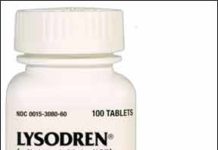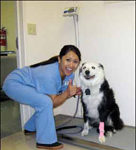How to Give Your Dog a Home Health Examination
Who among us has not fretted over a seemingly sick dog, wondering whether we bring him into the emergency vet clinic – or wait until morning? Pretty much every dog owner has done it at some point. And most of us have probably frustrated the heck out of the vet’s receptionist. Telling her that the dog is “just not himself!” doesn’t give her a lot to go on; it leaves her no choice but to advise us to bring the dog in! It’s far more helpful to all concerned if you first examine your own dog, gathering solid information about his condition, before calling the vet.
Addison’s Disease; Adding “Real” Foods; Canned Plants
Thank you so much for the recent article published about Addison’s disease in dogs. The day I read it my dog Hayleigh was showing almost every symptom, some she’s had on and off for years. The final clue was the frequent urination, which had started the day before. Because I read the article prior to taking her to the vet I knew to ask for the ACTH test in addition to the urine sample, which came back positive for primary Addison’s.
New Flea and Tick Products Hit the Market
Lately, it seems like new flea and tick control products have been popping up left and right. I suspect this is due to some of the original patents running out. When a patent expires, other companies can create generic versions of the same product, usually for less money. This inspires the original companies to create new products that they can patent anew. In some cases, new products are introduced because fleas and ticks may be developing resistance to the older products, lowering their efficacy. Most new products, including all those introduced this year, are just new combinations of older ingredients. Here’s a rundown on these new options.
Complementary Care for Dogs with Cushing’s Disease
Because the diagnosis and treatment of Cushing's disease can be confusing, expensive, and fraught with adverse side effects, many caregivers turn to alternative or complementary therapies. For those who prefer treatments that have been proven in double-blind, placebo-controlled clinical trials, unconventional therapies are themselves fraught with peril. Product testimonials and anecdotal reports don't prove anything, and by turning first to an herbal preparation or glandular extract, one might deny the patient an opportunity for effective treatment.
Diagnosing Atypical Cushing’s Disease in Dogs
What if your dog has all the symptoms of Cushing's excessive drinking, urination, and appetite; pot belly; skin problems; elevated alkaline phosphatase; etc. but the tests say no? Veterinary endocrinologists at the University of Tennessee in Knoxville (UTK) have been investigating this phenomenon. They found that many dogs have elevated steroid intermediates (also called steroid precursors or sex steroids") with normal cortisol. They call this condition "atypical Cushing's disease
Iatrogenic and Pseudo-Cushing’s in Dogs
A very small percentage of Cushing's cases result from medical treatments for other conditions, such as the use of prednisone or other corticosteroid medications to control allergies, arthritis, or autoimmune conditions. This is called iatrogenic" (doctor-caused) Cushing's. In these cases
Diagnosing Cushing’s Disease in Dogs
Sometimes life-threatening illnesses develop so slowly that no one pays much attention. An older dog who's always thirsty drinks huge quantities of water. He's hungrier than usual and has developed a thin coat and pot belly. He pants all the time, and now his hind legs are losing muscle tone and getting weak. Many owners dismiss these as normal signs of aging, but they are classic symptoms of Cushing's disease, which affects an estimated 100,000 dogs in the U.S. every year.
Chemotherapy for Dogs: What to Expect
Cancer. My heart dropped to my stomach. In February 2010 my Border Collie Daisy became one of an estimated six million dogs diagnosed with cancer each year. Chemotherapy. My stomach tumbled to my feet. The diagnosis was scary enough; how could I possibly consider chemotherapy? I had visions of a treatment worse than the disease itself. As it turns out, my preconceptions of chemotherapy were far worse than its reality. Chemo hasn't cured my dog more on that later but it's given us more than 18 months (and counting) of joyful, quality time together.
Merial Runs Out of Immiticide for Heartworm Treatment
The supply of Immiticide (melarsomine dihydrochloride), the only drug approved to treat heartworm infections in dogs, has been low since December 2009, but now it’s completely gone. Merial confirmed that it was officially out of the drug on August 9, 2011. The current situation is due to a new and separate manufacturing challenge related to technical issues with the company who provides the finished product, according to a Merial spokesperson. Merial said the company is working hard to make the drug available again, but cannot speculate when that might happen.
Holistic Care for Dogs with Addison’s Disease
While treatment of Addison's disease focuses on prescription drugs and electrolyte tests, holistic veterinarians add various support therapies to help their patients. Nutrition is the cornerstone of every holistic therapy, and while diet cannot cure Addison's disease, foods made of poor-quality ingredients or diets that lead to nutritional deficiencies are a significant source of stress, and additional stress is just what Addison's dogs don't need. Because wheat, corn, and soy are problem ingredients for some dogs, many holistic veterinarians recommend avoiding them. Some tell their clients to avoid grains altogether.
Daisy’s Chemotherapy Day
We arrive at the veterinary clinic at 7:45 AM. Daisy leaps out of the car and heads for the grass in front of the door; after a long squat, she makes a beeline for the entrance, pulling me behind her. It's always at this point I watch carefully to see if I can observe any signs of distress or apprehension about this almost weekly visit.Instead, she is excited about going in to seeing her buddies; if I were a betting person, I would put money on the notion that she enjoys these outings.
Addison’s Disease in Dogs: Detection and Treatment
Somethings wrong with your dog but youre not sure what. She seems listless, her eyes have lost their spark, and she just seems off. You might notice intermittent muscle weakness, tremors, and an inability to jump into the car or onto a sofa. Or your dog frequently ignores her dinner, vomits, or has diarrhea. These vague symptoms, which may improve and then return, could stem from a dozen canine illnesses or they might point to Addisons. Addisons disease, named for the 19th century physician who defined this adrenal gland dysfunction, is also known as hypoadrenocorticism or adrenal insufficiency. While fatal if left untreated, with appropriate treatment Addisons can be managed so that affected patients lead normal, active lives. First diagnosed in dogs in the 1950s, it is considered an uncommon canine disorder.

















